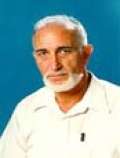ITZHACK YOAV BAR-ITZHACK, Professor Emeritus of Aerospace Engineering at the Technion – Israel Institute of Technology, died 9 May 2007 in his hometown of Haifa, Israel.
Itzhack Bar-Itzhack was born on 18 August, 1937 in Metula, Israel. He received his B.Sc. (EE) and M.Sc. (EE) degrees in 1961 and 1964, respectively, both from the Technion – Israel Institute of Technology. In 1968 he received the Ph.D. (EE) degree from the University of Pennsylvania. He joined the Technion’s Faculty of Aerospace Engineering as a Senior Lecturer in 1971, was promoted to Associate Professor in 1978, and achieved the rank of Professor in 1984. Prof. Bar-Itzhack held the Sophie and William Shamban Chair in Aeronautical Engineering until his retirement in 2006.
Prof. Bar-Itzhack was a prominent and world-renowned member of the Navigation community. He made seminal contributions to the art of Inertial and Aided Navigation Systems, and was one of the pioneers of the theory of strapdown Inertial Navigation Systems (INS). His first contribution was in his 1968 PhD dissertation entitled “Strapdown Inertial Navigation.” In 1977 he published his seminal paper on the navigation computation in Strapdown INS, titled “Navigation Computation in Terrestrial Strapdown Inertial Navigation Systems.” In 1985 he and a colleague published a groundbreaking paper, titled “The Enigma of False Bias Detection in Strapdown INS during In-Flight Transfer Alignment,” where they explained, for the first time, a phenomenon unique to Strapdown INS. In 1988, together with another colleague, he published the widely referenced paper “Control Theoretic Approach to Inertial Navigation Systems,” in which they formulated the INS error model in terms of modern control theory. This assisted newcomers to the field in quickly grasping the unique characteristics of INS. In 1992, together with his student, he published a paper that unified the common theory behind all INS error models. This enabled the straightforward development of new models represented by variables chosen by the user. Another outstanding contribution to the art of navigation was published in the 2000 paper “A New Inertial Azimuth Finding Apparatus,” where he and co-workers presented a novel apparatus, which they named IAFA, for quick North finding. Around 1995 Prof. Bar-Itzhack turned the focus of his research interests to the spacecraft attitude determination area. He quickly became a distinguished member of a select group of international experts in this field. He published extensively in this area, often with NASA co-workers, covering problems of attitude and angular rate estimation from vector measurements, attitude determination from GPS measurements, and combined attitude and orbit determination. Professor Bar-Itzhack contributed to the theory of applied optimal filtering as well, by developing, with students, batch-recursive data compression filters and eigenfactor-based square root filters.
In addition to his academic achievements, Prof. Bar-Itzhack worked on issues related to particular industrial systems. Between the years 1968 and 1971 he was employed by Bellcomm Inc. in Washington DC, where he worked on the Apollo project, analyzing the navigation system of the Lunar Roving Vehicle (LRV). In this capacity, among other activities, he wrote a computer program used during the Apollo 15 mission to determine where to realign the LRV navigation system Directional Gyro. In 1977-8, during his sabbatical, he worked for the Analytic Sciences Corporation in Reading MA, where he was involved in the Improved Accuracy Program of the Trident missiles guidance system.
Prof. Bar-Itzhack was very active in the national and international professional communities. He was a member of the AIAA Guidance, Navigation, and Control Technical Committee, and an International Advisor of the Journal of Guidance, Control, and Dynamics. He served as a President of the Israeli Association for Automatic Control (national member organization of IFAC). At the Technion – Israel Institute of Technology, Professor Bar-Itzhack served as Dean of the Faculty of Aerospace Engineering, member of the Technion’s Board of Governors, and member of the Senate Steering Committee, among numerous other positions.
Prof. Bar-Itzhack graduated 33 doctoral and master’s students. He published over 80 papers in major archival journals and 140 papers in conference proceedings. He received numerous professional honors, including the IEEE Third Millennium Award “…in recognition and appreciation of valued services and outstanding contributions,” the IEEE Kershner Award, awarded to “…individuals who have made a substantial contribution to the technology of navigation and position equipment, systems or practices”, the NASA Exceptional Technology Achievement Medal, the NASA Goddard Space Flight Center Group Achievement Award for “…exceptional achievement in advanced attitude determination and sensor calibration technology”, and four National Research Council associateship awards at NASA’s Goddard Space Flight Center. Prof. Bar-Itzhack was a Fellow of the AIAA “…in recognition of professional distinction and valuable contributions made to the arts, sciences and technology of aeronautics and astronautics.” He was also a Fellow of the IEEE “…for contributions to the development of inertial navigation systems.” Prof. Bar-Itzhack was chosen by the IEEE Aerospace and Electronic Systems Society to serve as a member of the Distinguished Lecturers Program, with his talk on “The Evolution of Inertial Navigation”.
Prof. Bar-Itzhack is survived by two sons – Daniel (41) and Ariel (36) of Haifa, Israel, and by 3 grandchildren – Roy (7), Itay (5) and Shira (5 months). His wife, Nehama, to whom he was married for 46 years, preceded him in death by 6 months.









